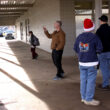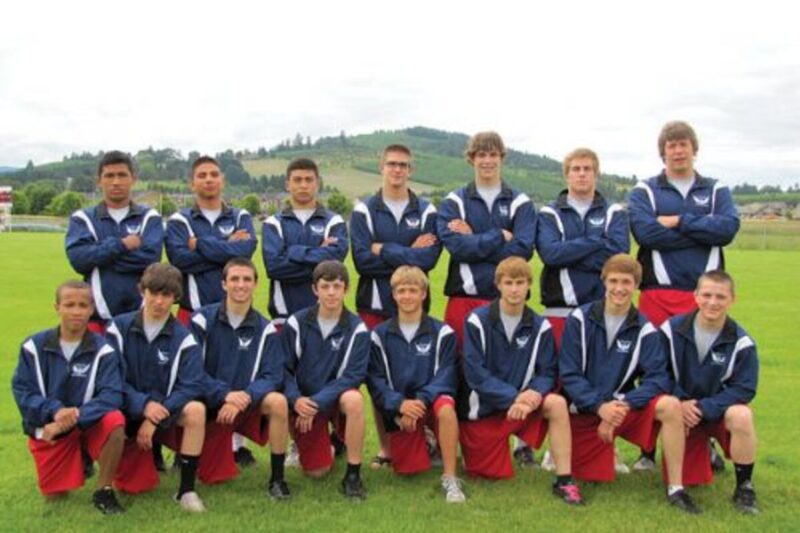Sean C. Morgan
Colton Schilling is happy to be an American.
He was reminded of that earlier this month, while on a 15-day trip with an Oregon cultural exchange wrestling team to Russia, when they visited a small Siberian village.
“It was pretty isolated,” said Schilling, 16. “The shower water ran straight from the river. We had tough times getting shower water so I just showered in the river a couple of times.
“They have very little power. The only places that had power were the wrestling gym, their school and a few houses and stuff. This was Siberia.”
It was an eye-opener for Schilling and his 14 teammates and three coaches, who traveled to Russia on June 22 and started their tour in Moscow, before visiting Amga, the small Siberian village, and then Yakutsk, in eastern Siberia before returning July 6.
Schilling, who visited South Africa last year with a similar exchange team, said this trip was more of a “cultural” experience for him, whereas South Africa was more “fun.”
He said he and his teammates were the first Americans who had ever appeared in Amga.
“We saw everything from very impoverished to very rich,” he said.
The wrestling component of their trip took place in Yakutsk, where they got to watch the three-day Russian National Championships, one of the biggest tournaments in the nation.
“The guy we were staying with was high up in everything. He got us VIP seats,” Schilling said.
The Oregon team included six state champions from 4A through 6A schools, one state runner-up and a third-place winner, he said.
Team members were 100-pounder Ray Woodward of North Salem, 106-pounders Josh Johnson of Forest Grove and Jo Middaugh of Yamhill, Isaac Aguilar of Hermiston (112), Jacob Cytrynbaum of South Eugene (117), Schilling (125), Tyler Berger of Hermiston (132), Shane Sheppard of Stayton (141), Joey Delgado of Hermiston (145), Abraham Rodriguez of Hermiston (152), Toney Chay of West Linn (160), Reid Shipley of North Medford (171), Gage Baumer Eagle Point (189), Curtis Berger of Hermiston (207) and Kyle Smith of Elmira (287).
Coaches were Rob Berger of Hermiston, Curtis’ father, Nathan Staley of Redmond and Frank Johnson of Forest Grove.
“Overall, we were a pretty good team,” Schilling said. “It was great – friendship building. It was a good experience overall.”
He lost one of his six matches, all freestyle. He said the competition stiffened after the Oregonians won their first dual.
“They had some republican champions, national champions our age and 23-year-olds and stuff like that,” he said. “We only had one or two guys that won. Most of our guys lost. The kids were all a weight or two above us.”
He said the wrestlers in Yakutsk use a “real relaxed, technical” style.
“They don’t look good when they’re warming up or anything, but they have such an awkward style that it’s hard to wrestle. They would just wait for you to make a mistake. They don’t care what they look like. They don’t care about anything except just getting out there and technically wrestling.”
Schilling said it was clear that the Russians take wrestling seriously.
“You could go to the lowest, poorest place and get to the wrestling gym and it’s perfect,” he said. “They have signs that say, ‘Oh Sport, you are our peace.’ Sport is the biggest thing there. The country donates machines, mats for sports complexes – particularly wrestling complexes.”
He said the fans were very knowledgeable and numerous.
“Everybody would go to a wrestling match. They were all whistling, all of them knew what they were talking about. At the nationals, if anybody got a takedown, you couldn’t hear what your buddy’s saying next to you, it was so loud.”
Schilling said the culture changed drastically as they traveled across Russia.
“There were no white people in Yakutsk,” he said. “It was completely different starting in Moscow, going to Yakutsk. They even had their own language.
“It was like I visited two countries when I was there They were six time zones away. It was pretty cool going from one part of country to another side of it.”
When the wrestlers arrived in Moscow they were given booklets with basic phrases in English, Russian and the Yakutsk dialect, which they used as much as possible. But mostly they relied on their wits.
“We had just started learning Russian, then we went to Yakutsk.”
“It was like playing charades,” he said. “Very, very few people spoke a little English. Anything you wanted, you had act it out, point. For some things, American-made foods like Orbit gum, you could just say it with a Russian accent and they’ll understand.”
Siberia’s climate contributed to some differences in how residents of Yakutsk live, he said. The city sits on top of a layer of permafrost 3 feet below the surface of the ground, so all pipes, including sewage are insulated and elevated above the ground.
The food was different too.
“We ate a lot of horse meat, stews, fish. They’d catch a fish right out of the river and throw it on a barbecue and serve it to you. They didn’t even clean it.”
Because of the long, cold winters, it appeared that people enjoyed warm drinks during the short summer months, he said.
“As soon as I got back to Moscow, I went to a freezer and got a bottle of water,” Schilling said.
He said his experience was worth the downsides, such as jet lag after being in a time zone 11 hours away from Oregon.
“To think I went all the way across the world and I’ve been to Russia, not many can say that,” he said. “It makes me just kind of appreciate what we have.”





